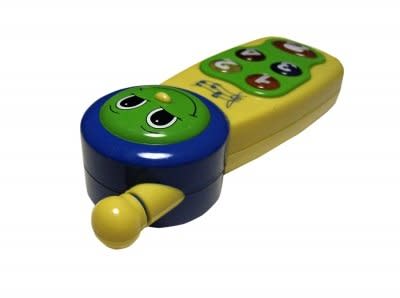Parenting Guru: Technology and Toys: are we sabotaging our kids imaginations?

Walk up and down the baby aisle at any store, and you'll notice that most baby toys look the same. They light up, make sounds, sing songs or have some exciting electronic reaction when the baby touches a button or pulls on a happy, friendly face. Even certain models of the bouncy chairs can be turned on. The baby watches as bubbles move inside a plastic container, and music and lights entrance him as he sits and watches.
When you are a brand new parent, these toys look awesome. You find yourself pressing buttons too, lighting up with delight just anticipating the joy your child will find in these fun gadgets. But as a new parent, you are also warned. "A child should avoid television viewing for the first two years of life," advises the American Academy of Pediatrics. When you think about it, these seem to be mixed messages. Aren't electronic toys just like tv?
No, electronic toys are not the same. They're 'interactive.' Really? Wait a minute. Yes, the toys require some interaction, whereas television is entirely passive, but the result is the same. The baby watches as the toy lights up and sings a song. Isn't this just a junior version of a video game?
Before I was a parent, I was a teacher. Technology was everywhere, even when it wasn't allowed to be. Gone are the days of note passing. A text message serves this purpose and is much more difficult to notice, since kids are experts at sending a message while looking straight at the teacher as she talks. On a daily basis, I overheard student conversations about playing video games, watching movies, getting new apps for phones and updating Facebook profiles. I had to constantly remind students to use actual English in their writing instead of instant message language. And I only taught sixth grade.
Baby toys and adolescent attention spans- two completely separate subjects.
Maybe.
The other day, I spent some time reading reviews of baby toys, wanting to buy my son some new ones as he grows into a new stage of development. I started selecting toys to put on a 'favorites' list. Later, I realized that all of them played songs, lit up, or did some kind of electronic dance. In fact, it took me 45 minutes to find one toy that wasn't battery operated but still taught cause and effect and was entertaining. As with all technology, there is a time and a place for electronics, but what happened to all the other types of toys? Why are those so hard to find?
I started thinking. Electronic toys are the toys that are readily available; these are the toys most babies play with. Whenever I take my son to a friend's house, these are the toys he reaches for. Just as an adolescent may gravitate toward a video game, a baby will gravitate toward the toy that lights up and looks entertaining. Who wants to open a box of blocks when there's a play kitchen that will make 50 different noises and sing a song?
But here's where I struggle. By giving babies so many electronic toys, are we programming them early to be attracted to electronic gadgets? If a baby spends the first couple of years of her life pressing buttons and watching the toy entertain her, how easily will she be able to play with toys that don't respond back? And the more important question: Is this why children and teenagers are so reliant upon electronic toys and learning tools? Are we sabotaging their imagination in infanthood and we don't even know it?
Where do you stand on this issue? Are these two ideas connected?
Sarahlynne, a Parenting Guru at Yahoo! Shine, has a Masters of Education in Literacy and is working on a novel for young adults.
